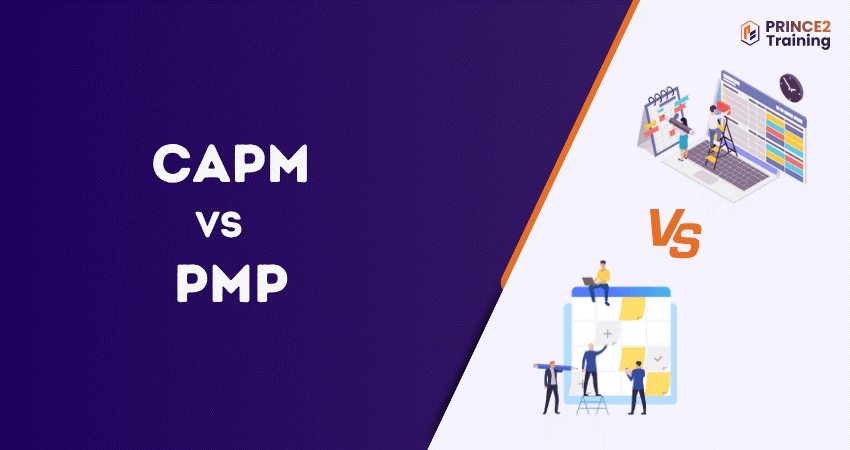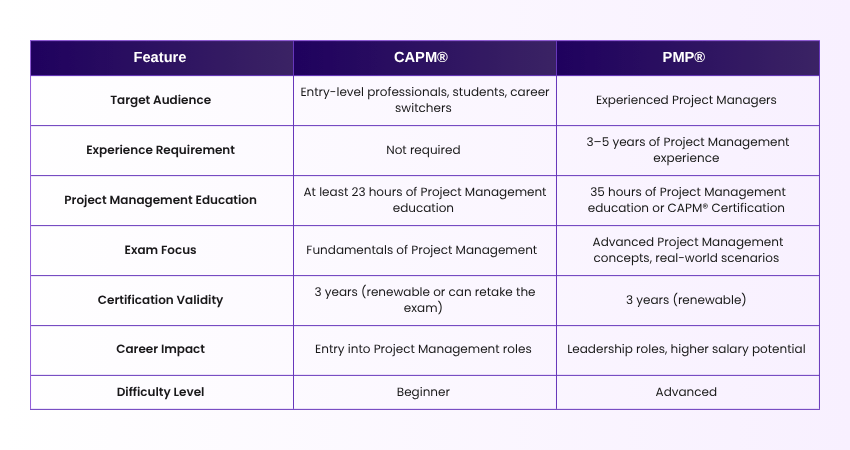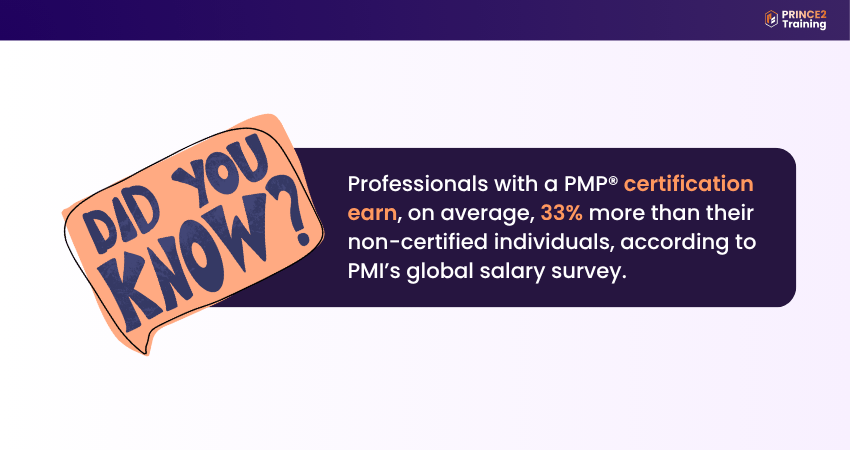Table of Contents

Your next promotion could depend on this decision: CAPM or PMP? Choosing between these two can change your designation. It might sound surprising, but it’s true. Securing the right Project Management Certification can shape your career growth, salary, and wider opportunities.
When comparing CAPM vs PMP, you need to understand that both are Project Management Certifications. However, each has its own purposes, benefits, costs, and requirements. Becoming aware of the differences is crucial to takinng the next life-changing career step. So, let’s quickly delve into this blog to know the key differences to make an informed decision!
Table of Contents
1) What is CAPM?
2) What is PMP?
3) Differences Between CAPM vs PMP
4) Tips to Choose Between PMP and CAPM
5) Is Upgrading the CAPM to a PMP Possible?
6) CAPM vs PMP: Salary Comparison
7) Conclusion
What is CAPM?
The Certified Associate in Project Management (CAPM) is an entry-level certification offered by the Project Management Institute (PMI). It is designed for individuals who are new to Project Management or to demonstrate their understanding of Project Management principles, values, and concepts.
CAPM is suitable for fresh graduates, Assistant Project Managers, or people who want to work in Project Management roles.
Benefits of CAPM
1) Entry-level Recognition: Validates your understanding of basic Project Management concepts.
2) Improves Employability: Adds credibility to your profile, which sets you apart from non-certified candidates.
3) Pathway to PMP: Becomes a stepping stone for future certifications in Project Management.
4) No Experience Required: Ideal for students and people looking for a scale in their career.
Builds Confidence: Helps professionals with fundamental project planning and monitoring skills.
What is PMP?
The Project Management Professional (PMP) is an advanced certification offered by PMI. It is globally recognised and is considered the gold standard for Project Managers. The PMP is designed for experienced professionals managing complex projects and leading cross-functional teams.
The PMP focuses on three key domains: People, Process, and Business Environment. They align with Agile, hybrid, and traditional project environments.
Benefits of PMP
1) Global Recognition: Recognised across industries all over the world.
2) Higher Salary Potential: Professionals with PMP Certification typically earn more than their non-certified peers.
3) Professional Credibility: Shows high-level project leadership and technical competence.
4) Broad Application: Useful across various sectors such as Information Technology (IT), construction, healthcare, finance, and more.
5) Career Advancement: PMP offers career enhancement to senior roles, leadership positions, and international job opportunities.
Differences Between CAPM vs PMP
CAPM and PMP can be suitable for different people and purposes. Here’s a detailed analysis of the key differences:

1) CAPM and PMP Exam Prerequisites
To take the CAPM Certification, you need to have a secondary degree, such as a high school diploma, General Educational Development (GED), or a global equivalent. No prior Project Management experience is required. Thus, it is ideal for beginners.
To attend the PMP Course, you need to have a secondary diploma. Prior experience in Project Management is highly beneficial for the successful completion of this course.
2) Exam Format and Structure
The CAPM exam consists of 150 multiple-choice questions, and it lasts for 3 hours. It focuses mainly on the fundamentals of the Project Management Body of Knowledge (PMBOK®) Guide.
The PMP exam includes 180 questions in various formats like multiple choice, drag-and-drop, and multiple responses. This exam is approximately 3 hours and 50 minutes.
3) Estimated Exam Preparation Time
CAPM candidates typically prepare within two to three months with part-time study. This is because this exam is more theory focused.
PMP preparation usually takes about three to six months due to its complexity. It requires a deeper understanding, real-world experience, and critical thinking skills.
4) Certification Bodies
Having a certificate from a recognised institute can significantly enhance your profile and credibility. When you earn a certification, it tells employers that you’re trained in best practices and that you’re serious about your Project Management career. These certifications can open doors to better job roles, higher credibility, and global work opportunities. To explore recognised training options, you can visit PRINCE2 Training.
Tips to Choose Between PMP and CAPM
Before choosing between PMP and CAPM, it’s important to check the key details of each. Here are a few tips for you to analyse every aspect of each course before finalising which suits you better:

1) Eligibility
PMI sets specific eligibility criteria for both certifications. CAPM requires only a secondary degree, whereas PMP requires three to five years of project experience. If you meet the requirements, pursuing a PMP is a great step toward career advancement, as it is more prestigious and widely recognised.
2) Career Paths
CAPM is perfect for those beginning a Project Management career or adding a credential to support growth in their current role. PMP is better suited for professionals who already have an understanding of Project Management Methodologies and who are ready to lead larger projects or move into senior roles.
3) Employment Opportunities
CAPM holders often take on roles such as Project Coordinator, Assistant Project Manager, Program Manager, or Project Analyst. PMP Certification, by contrast, qualifies candidates for full-time, senior-level Project Management roles, where they may lead large, complex initiatives across multiple teams or departments.
Deliver flexible and efficient projects with our Agile Project Management Foundation (AgilePM® V3) Course – Join now!
Is Upgrading the CAPM to a PMP Possible?
You cannot directly upgrade a CAPM Certification to a PMP Certification. However, earning the CAPM is still a smart first step if you're new to Project Management. The knowledge and skills you gain through CAPM can help you prepare for the PMP exam in the future. Even better, the Project Management education hours completed for the CAPM can count toward the 35-hour education requirement for the PMP.
If you’re just starting your career in this field, CAPM builds a strong foundation and shows your commitment to the field. After gaining the required experience over the years, you’ll be eligible to apply for the PMP Certification, which can lead to senior roles and higher salaries.
CAPM vs PMP: Salary Comparison
According to PayScale data:
CAPM-certified professionals earn an average of approximately £42,428 per year, typically in junior roles like Project Coordinator or Assistant Project Manager.
PMP-certified professionals earn around £62,000 per year on average, often working as Project or Programme Managers, with senior roles exceeding £100,000 depending on experience and industry.
Conclusion
When deciding between CAPM vs PMP, the choice ultimately depends on your experience, career goals, and current role. CAPM offers a solid foundation for those entering the field, while PMP is the top-tier certification for experienced project leaders. Whether you’re taking your first step or climbing higher in the Project Management world, there’s a certification path that fits you.
Lead teams and optimise resources with our PMI® Certification – Be a part of it immediately!




 Back
Back


 Back to
topics
Back to
topics










